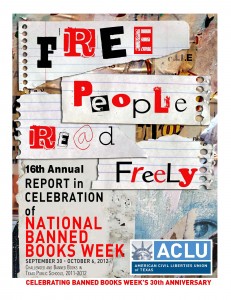 Each year, the ACLU of Texas contacts the 1,000+ school districts in the Lone Star State to find out why books are banished from classrooms, library shelves, and reading lists. For 2011-2012, they were excited to find that book challenges are down, but the fight is far from over. In “Free People Read Freely: The 16th Annual Report in Celebration of Banned Books Week,” Texas ACLU Executive Director Terri Burke writes in her forward:
Each year, the ACLU of Texas contacts the 1,000+ school districts in the Lone Star State to find out why books are banished from classrooms, library shelves, and reading lists. For 2011-2012, they were excited to find that book challenges are down, but the fight is far from over. In “Free People Read Freely: The 16th Annual Report in Celebration of Banned Books Week,” Texas ACLU Executive Director Terri Burke writes in her forward:
Although I continue to be surprised at some of the books that are challenged and the reasons why, I am happy to report fewer books were banned last school year. In many cases, those that were banned or restricted were in elementary school libraries where their content was considered too mature for younger children. The books weren’t denied to older students.
According to the report, the results of challenges in Texas schools ran the gamut:
Some schools indicated they “restricted” these books from the elementary schools, either moving to a higher grade level or restricting only for the child whose parents protested its use. Some chose to ban the challenged books all together.
The 2011-2012 school year saw the following books removed from shelves:
Dark Rivers of the Heart, Dean Koontz
Dash and Lily’s Book of Dares, Rachel Cohn
Call Me Hope, Gretchen Olson
Love and Other Four Letter Words, Carolyn Mackler
Num8ers, Rachel Ward
Sidekicks, Dan Santat
10,000 Dresses, Marcus Ewart
The Adventures of Super Diaper Baby, Dav Pilkey
The Boy Who Couldn’t Sleep and Never Had To, D.C. Pierson
The Storm in the Barn, Matt Phelan
Vampires, Jennifer Besel
When is it Right to Die?, Joni Eareckson
The following list of titles, which includes a notable selection of frequently challenged classics and Jeff Smith’s acclaimed series Bone, were restricted in Texas libraries during the 2011-2012 school year:
A Farewell to Arms, Ernest Hemmingway
A Long Way Gone, Ishmael Beah
Beloved, Toni Morrison
Bone series, Jeff Smith
Catcher in the Rye, J.D. Salinger
Chronicle of a Death Foretold, Gabriel Garcia Marquez
City of Glass, Cassandra Clare
Incredible Journey through the Human Body, Nicholas Harris
Jake Reinvented, Gordon Korman
Molly’s Family, Nancy Garden
Number the Stars, Lois Lowry
Shipwreck at the Bottom of the World, Jennifer Armstrong
Tess of the d’Urbervilles, Thomas Hardy
The Awakening, Kate Chopin
The Kite Runner, Khaled Hosseini
The Outsiders, S.E. Hinton
The Princess Diaries, Vol VI: Princess in Training, Meg Cabot
The Things They Carried, Tim O’Brien
Let’s take a look at two comics series of note that made the lists of banned and restricted books: Sidekicks and Bone.
Sidekicks, a series by Dan Santat, focuses on the superhero Captain Amazing and his search for a sidekick among his four pets, who compete with each other for the position. The ACLU report describes the ban:
Nederland ISD
School: Helena Park Elementary
Book: Sidekicks, Dan Santat
Reason cited: Profanity
Action Taken: Banned
Note: Language was inappropriate for the ages of the students on this campus
Bone was not removed from school campuses, but it was restricted:
Graham ISD
School: Crestview Elementary
Book: Bone series, Jeff Smith
Reason cited: Not appropriate for age group
Action Taken: Restricted
Note: Moved up to junior high school, where more copies of the series are needed; book not banned from district.
It is interesting to note that Scholastic, the publisher of the color editions of the Bone and Sidekicks, lists both series as appropriate for ages 8 to 12. In removing the books from the elementary school library through an outright ban and restriction, school authorities were removing the books from the access of the intended audience.
The ACLU of Texas describes each book that faced challenge in schools in their report, providing an illuminating look at the books that were challenged and why they were retained, restricted, or banned. The report also features an interview with Tony Diaz, who is the founder of Nuestra Palabra: Latino Writers Having Their Say and Librotraficantes, the organization that is “trafficking” banned books from the defunct Mexican American Studies Program into Arizona schools. You can download a copy of the complete report here.
Given their visual nature, graphic novels and comic books are among the most-challenged books in libraries and schools. CBLDF is an official sponsor of Banned Books Week, which takes place September 30 – October 6, 2012. Please help support CBLDF’s defense of your right to read by making a donation or becoming a member of the CBLDF!
Betsy Gomez is the Web Editor for CBLDF.